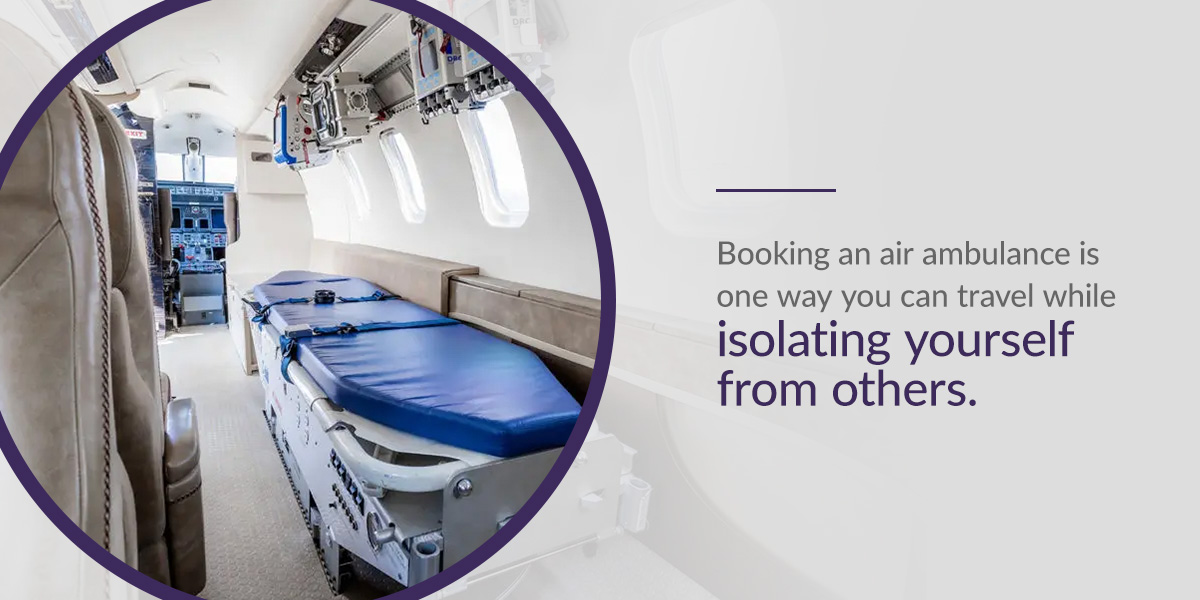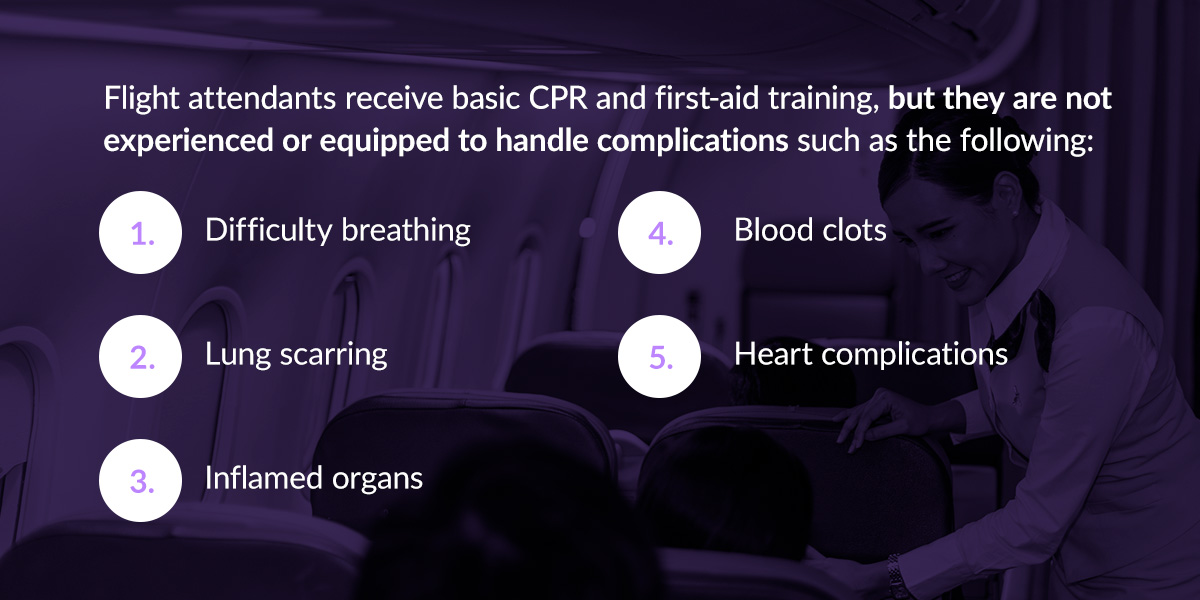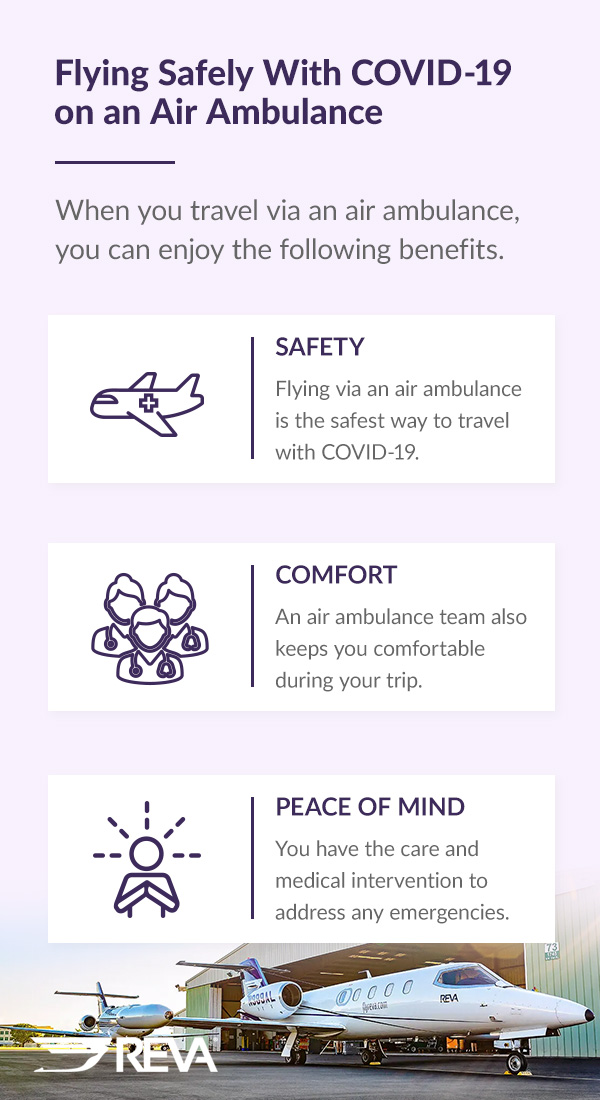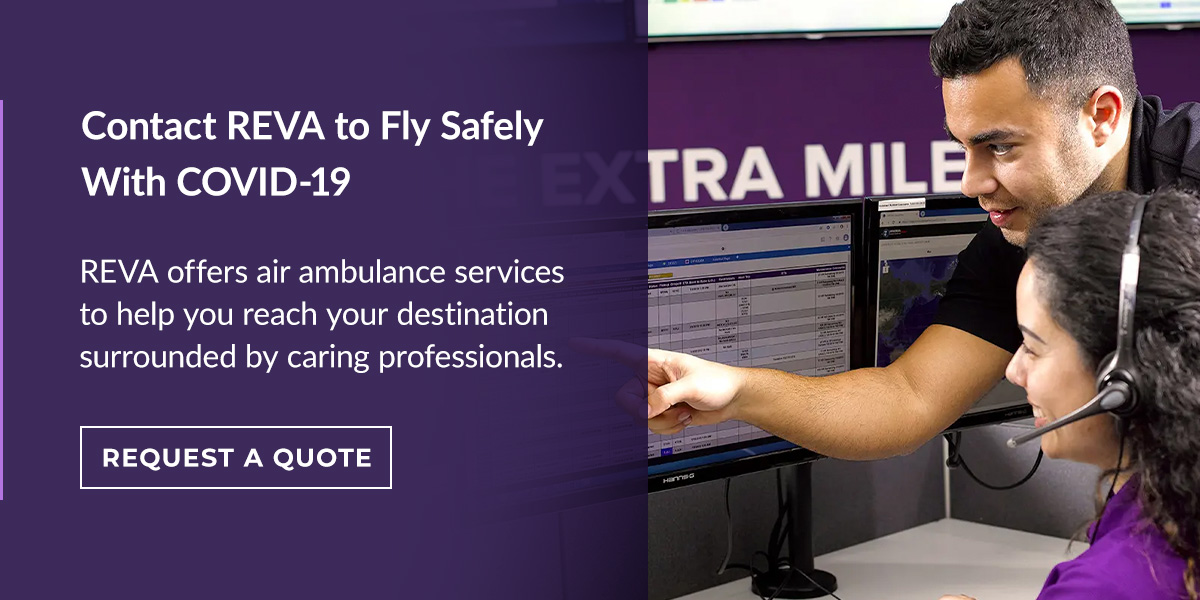You can fly with COVID-19 when you travel via a safe, dependable air ambulance. Your safety and the safety of others are paramount when it comes to air travel and COVID-19. Public transportation increases the risk of spreading COVID-19, and commercial airlines lack the medical supplies and expertise necessary if a complication occurs mid-flight.
While airline COVID-19 restrictions have been lifted, current COVID-19 guidance still stresses the importance of avoiding contact with others. An air ambulance provides a private, safe aircraft fully equipped with medical providers, supplies and equipment.
COVID-19 Travel Restrictions
COVID-19 travel restrictions can change by date, airport and airline. When COVID-19 first became a global pandemic in 2020, governments, airlines and airports enforced strict policies to prevent the spread of the disease. Air travel halted for a while until it was safe to resume, and passengers could eventually travel under certain restrictions. At first, most airlines required each passenger to take or provide proof of a negative COVID-19 test, maintain social distancing and wear a mask during their flight.
After the COVID-19 vaccine became available, the government and individual airlines allowed passengers to board flights if they had proof of receiving the vaccine. As vaccinations became more widespread, governments and airlines began shifting their policies. Some airlines allowed vaccinated passengers to fly without a mask, while others required a vaccine and a mask to board a plane. Some countries continued requiring individuals to test for COVID-19 before entering, while others eliminated this requirement.
As time passed, governments lifted COVID-19 restrictions globally. However, checking your destination’s requirements before traveling is essential because countries can reinstate policies at any time to control the disease. Depending on where you fly out of and where you fly to, you may need to show proof of vaccination, take a COVID-19 test, or wear a mask during your flight. Even when airlines have no COVID-19 policies in place, it is still unsafe to fly with other passengers if you contract the disease.
Are Masks Required on Planes?
As mentioned above, most airlines have lifted COVID-19 restrictions, including the mask requirement. A country or airline may reinstate the mask requirement if the spread of COVID-19 increases, so you should check your airline’s policies if you’re unsure.
Can You Fly Internationally With a Positive COVID-19 Test?
The Centers for Disease Control and Prevention (CDC) advises against international travel if you test positive for COVID-19. Avoiding international travel when you are sick reduces the spread of the disease between countries.
Can You Fly Domestically With COVID-19?
The CDC also advises individuals to avoid domestic commercial flights after testing positive or showing symptoms of COVID-19. If you test positive, you should isolate yourself and contact a health care professional for further instruction or treatment. Halting or limiting your interactions with other people is essential for disease control.
Booking an air ambulance is one way you can travel while isolating yourself from others. An air ambulance is a private medical aircraft that transports you with a team of flight medics, enabling you to receive care during your flight and avoid spreading the virus to other passengers.
Will They Let You on the Plane if You Have COVID-19?
Airlines currently do not have COVID-19 testing, vaccination or quarantine requirements to board a plane. However, an airline may deny boarding if you are visibly ill and show signs of serious illness. Some passengers are unable to board a plane if the airline deems them unable to care for themselves during the flight.
Can You Fly With COVID-19 if You Wear a Mask?
Flying with a mask while sick can help you reduce the spread of COVID-19 and is certainly safer than not wearing a mask. However, masks do not guarantee you will keep your germs contained. Flying while wearing a mask still puts others at risk of contracting the disease from you.
Can You Fly Home With COVID-19?
You may contract COVID-19 in another country and wish to return home, but limiting the spread is still crucial. If you find yourself with COVID-19 while traveling abroad, the safest way to travel is via an air ambulance or medical evacuation flight.
Risks of Traveling With COVID-19
Flying on a commercial flight with COVID-19 poses the following risks.
Spreading the Virus
While most airlines stopped testing individuals for COVID-19 before boarding flights, it’s still a passenger’s responsibility to limit the spread. Flying when you knowingly have COVID-19 places others at risk of catching the virus, and there’s no way of knowing how they will react to it. Some individuals recover quickly from COVID-19, but others experience serious complications.
Wearing a mask while you have COVID-19 limits the spread, but you still place others at risk on a flight if you travel with the virus. Commercial plane cabins are tight quarters, placing you in very close contact with fellow passengers.
Discomfort
Flying with COVID-19 can be uncomfortable even if you are without serious complications. Common COVID-19 symptoms include the following:
- Coughing
- Shortness of breath
- Sore throat
- Nausea and vomiting
- Diarrhea
- Fever
- Fatigue
- Headaches
- Body and muscle aches
- Congestion
COVID-19 symptoms can worsen over time. You may experience mild to moderate symptoms for a few days to a week and then experience worsening symptoms seven to 14 days after contracting COVID-19.
Managing COVID-19 symptoms on a commercial flight can be challenging because you are in tight quarters. Rest and comfort are essential for recovery, so it’s best to look into private flight options. Flying on a medical aircraft can help you remain safe and comfortable during your flight, and you have a medical team to monitor your health and intervene if necessary.
Potential Health Complications
You may recover from COVID-19 with few symptoms, but serious health complications are possible. Flying on a commercial aircraft leaves you without access to immediate medical intervention if your symptoms worsen.
Contracting COVID-19 can result in unexpected and serious symptoms, and some people experience ongoing complications after they recover. These lingering side effects are known as long COVID-19, and they typically begin four weeks after contracting COVID-19.
Flight attendants receive basic CPR and first-aid training, but they are not experienced or equipped to handle complications such as the following:
- Difficulty breathing: A moderate case of COVID-19 causes a deep infection in the lungs, and severe cases may require hospitalization and oxygen for a successful recovery. A critical COVID-19 case can lead to respiratory failure and cause damage throughout the entire body.
- Lung scarring: COVID-19’s effects on the lungs can lead to lung fibrosis, which is a condition that clots and scars the lungs. Lung fibrosis makes breathing difficult and can be fatal.
- Inflamed organs: Rare cases of COVID-19 can cause tissue and organ inflammation, which is known as multisystem inflammatory syndrome.
- Blood clots: Some individuals develop blood clots after contracting COVID-19. These blood clots can develop in various locations and organs throughout the body, and they can lead to serious complications such as stroke, heart attack or lung damage. Flying can further increase the risk of blood clots because it forces you to remain immobile for a long period of time.
- Heart complications: Individuals have a higher risk of stroke and cardiovascular disease for up to a year after contracting COVID-19.
You should seek emergency assistance immediately if you experience symptoms like trouble breathing, discolored skin or lips, confusion, difficulty waking up or staying awake, or consistent chest pressure or pain. If you fly in an air ambulance, an experienced medical team can provide emergency care as soon as complications arise.
Are You at Risk of Developing Serious COVID-19 Complications?
Anyone can develop serious complications after contracting COVID-19, but some individuals have a higher risk of severe side effects. You are more likely to experience serious complications if you also have one or more of the following conditions:
- Cancer
- Asthma
- Cystic fibrosis
- Chronic kidney disease
- Cerebrovascular disease
- Chronic lung diseases
- Chronic liver disease
- A heart condition, such as coronary artery disease
- Diabetes
- HIV
- Neurologic conditions
- Immunodeficiencies
- Pregnancy
- Tuberculosis
You also have a higher risk of complications if you are 50 or older, smoke or have a sedentary lifestyle.
Importance of Flying With Medical Support When You Have COVID-19
Medical support is crucial when you travel with COVID-19. COVID-19 symptoms vary between mild discomfort and severe complications, and there’s no way to predict how much your symptoms may change. If you fly on a commercial airline while you have COVID-19, you may experience a medical emergency with little to no support. While commercial airlines can make emergency landings if necessary, they are less reliable than private medical flights.
Flying Safely With COVID-19 on an Air Ambulance
A private medical flight, such as an air ambulance, transports you safely on a fully equipped aircraft. Air ambulances contain life-saving medical supplies and equipment, and air ambulance teams provide professional, compassionate care during your flight. When you travel via an air ambulance, you can enjoy the following benefits.
Safety
Flying via an air ambulance is the safest way to travel with COVID-19. A highly-trained medical team is with you the entire time to monitor your condition and intervene if necessary. Your flight medical team has the experience and supplies to respond to emergency situations such as difficulty breathing or heart complications, and they can take you to the nearest hospital quickly if you require more extensive care.
Comfort
An air ambulance team also keeps you comfortable during your trip. Rather than sitting in a crowded cabin plane with little room to move, you can rest comfortably on a stretcher and receive special care and attention during your flight.
Peace of Mind
When you fly via an air ambulance, you can travel with peace of mind. With an air ambulance, you can relax knowing that you have the care and medical intervention to address any emergencies that could arise. You can also rest assured that you will not spread COVID-19 to other passengers on a crowded plane.
REVA’s Air Ambulance Services
REVA offers unparalleled medical transport services. If you contract COVID-19 and need to travel, you can depend on REVA to deliver the following advantages.
We Handle Everything
At REVA, we take care of you from bedside to bedside. We determine your financial options, process documents, protect your sensitive information and complete the reimbursement process to ensure a smooth process. We also organize ground transportation and coordinate medical teams for the beginning, duration and end of your flight so you are in good hands from takeoff to landing.
Our Teams Offer the Safest Care and Transport
REVA’s medical and flight teams receive ongoing training to ensure the best care. The following factors make our safety management system one of the best in the industry:
- Three-tiered safety method: We coordinate regular training and monthly drills, take a proactive approach to safety concerns, and operate a management system that meets International Civil Aviation Organization (ICAO) and Federal Aviation Administration (FAA) regulations. We use this three-tiered method to prioritize each passenger’s safety.
- Flight-risk assessments: Our risk control and flight-risk assessments enable us to avoid complications and provide safe transportation you can depend on.
- Experienced teams: Before joining the REVA team, each employee is required to have at least three years of work experience in emergency medicine, trauma, critical care or intensive care. Medical team members also hold flight physiology certifications.
- Thorough training programs and in-house instruction: REVA provides each employee with specific training related to their exact responsibilities, and medical teams complete annual, quarterly and weekly training that covers every patient care aspect. In-house instructors provide REVA’s flight and medical teams with continuous, demanding training to ensure they provide top-tier care and transportation.
We Exceed Expectations
REVA exceeds industry standards and expectations. We hold several association memberships and accreditations that reflect our dedication to safety:
- ARGUS Platinum: The Aviation Research Group United States (ARGUS) grades aircraft operators’ safety history. REVA earned the ARGUS Platinum rating, which is the highest level a company can meet for aviation quality and safety.
- NAAMTA: The National Accreditation Alliance Medical Transport Applications (NAAMTA) is an accreditation organization that sets high medical transport provider standards. REVA provides an unmatched safety approach that complies with each NAAMTA standard.
- EURAMI: The European Aero-Medical Institute (EURAMI) accredited REVA in the long-range/Intercontinental fixed-wing category of safety standards. This accreditation reflects REVA’s expertise in providing long-haul pediatric, neonatal and adult critical care transportation.
Contact REVA to Fly Safely With COVID-19
Flying commercially with COVID-19 places you at risk of experiencing serious health complications without access to medical attention, and it exposes others to the virus. However, you can fly with a positive COVID-19 test if you travel on a private medical flight. An air ambulance is an excellent alternative to commercial airlines that provides you with compassionate medical care and safe transport. REVA offers air ambulance services to help you reach your destination surrounded by caring professionals in a fully equipped medical aircraft.
REVA’s air ambulance services hold several awards and accreditations, reflecting our dedication to safety. Our team handles everything for you. From determining your financial options to organization ground transportation, we ensure you have medical support during each stage of your flight. Contact us to request a quote and learn more about our air ambulance services.





